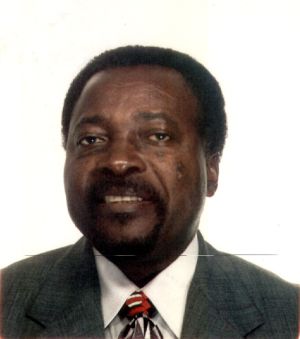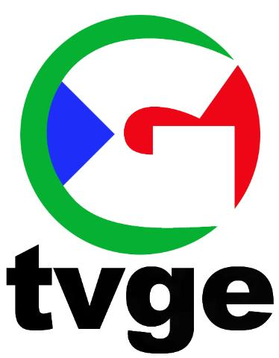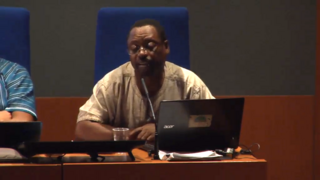Related Research Articles

Equatorial Guinea, officially the Republic of Equatorial Guinea, is a country on the west coast of Central Africa, with an area of 28,000 square kilometres (11,000 sq mi). Formerly the colony of Spanish Guinea, its post-independence name refers to its location near both the Equator and in the African region of Guinea. As of 2021, the country had a population of 1,468,777, over 85% of whom are members of the Fang people, the country's dominant ethnic group. The Bubi people, indigenous to Bioko, are the second largest group at approximately 6.5% of the population.

Equatorial Guinea is divided into two regions and eight provinces. The newest province is Djibloho, created in 2017 with its headquarters at Ciudad de la Paz, the country's future capital.
Colegio Nacional Enrique Nvó Okenve is a college in Equatorial Guinea. The college has two campuses, based in the cities of Bata (seat) and Malabo.

Bata Airport is an airport serving Bata in Litoral, Equatorial Guinea. It is the second largest airport in Equatorial Guinea after Malabo International Airport.

Malabo Airport or Saint Isabel Airport, is an airport located at Punta Europa, Bioko Island, Equatorial Guinea. The airport is named after the capital, Malabo, approximately 9 kilometres (5.6 mi) to the east.

The Catholic Church in Equatorial Guinea is part of the worldwide Catholic Church, under the spiritual leadership of the Pope in Rome.

Equatorial Guinea is a Christian majority country, with Islam being a minority religion. Due to the secular nature of the country's constitution, Muslims are free to proselytize and build places of worship in the country.

Leandro Mbomio Nsue Edú-Aguong was an Equatorial Guinean sculptor and artist, and former minister of Education and minister of information, tourism, art and culture.

The National University of Equatorial Guinea is a public institution of higher education, being one of the main universities of Equatorial Guinea in Central Africa.
According to Article 3 of the Constitution of Equatorial Guinea, the country is divided for administrative and economic purposes into regions, provinces, districts, and municipalities. In practice, the provinces serve as the first-level administrative divisions. Municipalities are subdivided into village councils and neighbourhood communities. Many of the sub-municipal entities are grouped into urban districts, which remain subordinate to municipalities and are distinct from districts proper.

Djibloho, officially the Administrative City of Djibloho, is a province of Equatorial Guinea, formally established by law in 2017. The administrative city was initially carved out of Añisok, a district in Wele-nzas, on 1 August 2015, and was created to eventually replace Malabo as Equatorial Guinea's national capital.

Equatorial Guinea–Spain relations are the diplomatic relations between Equatorial Guinea and Spain. Both nations are members of the Association of Academies of the Spanish Language, Organization of Ibero-American States and the United Nations.

Ramón Nse Esono Ebalé is an Equatorial Guinean illustrator and comics artist. He draws under the pseudonym Jamón y Queso.

Florencio Mayé Elá Mangue is an Equatoguinean military leader, politician, and diplomat.
Salvador Elá Nseng Abegue was an Equatorial Guinean military leader, politician, and diplomat.

Televisión de Guinea Ecuatorial is an Equatorial Guinean state television channel, which is part of the public media system called Radio Televisión de Guinea Ecuatorial (RTVGE).
The Treaty of Friendship and Cooperation between Spain and Equatorial Guinea is a bilateral treaty signed on 23 October 1980 in Madrid by the First Vice President and Commissioner of the Ministry of Foreign Affairs and International Cooperation of Equatorial Guinea, Florencio Mayé Elá and the Minister of Foreign Affairs of Spain, José Pedro Pérez-Llorca. The treaty was published in the Boletín Oficial del Estado on 27 July 1981.

Remei Sipi Mayo, also known as Tía Remei, is an Equatorial Guinean writer, editor, educator, and activist focused on gender and development.
During the afternoon of 7 March 2021, a series of four explosions occurred at a military barracks in the neighborhood of Nkoantoma, a district of Bata, Equatorial Guinea. At least 107 people died, and more than 600 others were injured, while significant infrastructural damage also occurred throughout the city.

Alfredo Okenve Ndoho is an Equatoguinean physics professor and human rights activist who is the vice president of the Centre for Development Studies and Initiatives, a human rights organisation in Equatorial Guinea.